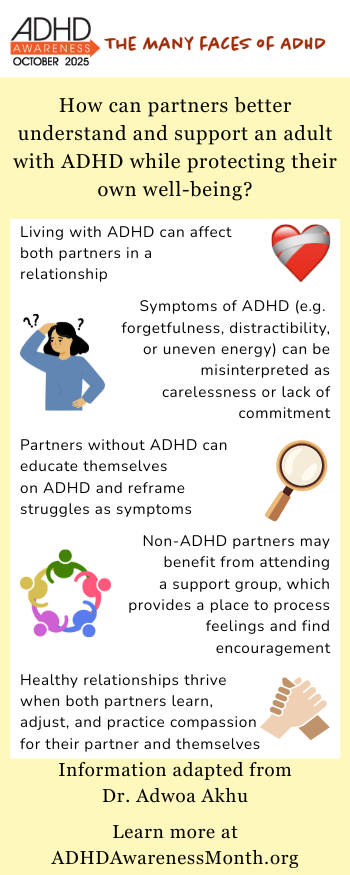Living with ADHD can affect both partners in a relationship. The healthiest bonds are built when both people learn, adjust, and practice compassion—for their partner and themselves.
A couple I worked with described their recurring argument: she felt ignored when he forgot to take out the trash; he felt criticized for something he couldn’t control. This cycle is common in relationships touched by ADHD (Barkley & Murphy, 2006). Symptoms like forgetfulness, distractibility, or uneven energy can easily be misinterpreted as carelessness or lack of commitment.
Education can shift everything. Once the partner without ADHD began to see forgetfulness as a symptom—not disrespect—the tension eased. They set up a shared calendar and reminder system, which lowered stress for both (Shaw, Stringaris, Nigg, & Leibenluft, 2014).
But supporting a partner doesn’t mean neglecting yourself. The non-ADHD partner in this case also began attending a support group, giving her a place to process her feelings and find encouragement. She told me, “It helps me show up with more patience because I’m not running on empty.”
Healthy relationships thrive when both partners are cared for. Compassion, open communication, and practical systems can turn frustration into teamwork (Barkley, Fischer, Smallish, & Fletcher, 2006).
About the Author

Dr. Adwoa Akhu is a licensed psychologist, author, and trainer specializing in stress resilience, burnout prevention, and ADHD support. She blends science, compassion, and practical tools to help people thrive.
References
- Barkley, R. A., Fischer, M., Smallish, L., & Fletcher, K. (2006). Young adult outcome of hyperactive children: Adaptive functioning in major life activities. Journal of Abnormal Psychology, 115(3), 553–567.
- Shaw, P., Stringaris, A., Nigg, J., & Leibenluft, E. (2014). Emotion dysregulation in attention-deficit/hyperactivity disorder. American Journal of Psychiatry, 171(3), 276–293. https://doi.org/10.1176/appi.ajp.2013.13070966
- Barkley, R. A., & Murphy, K. R. (2006). Attention-deficit hyperactivity disorder: A clinical workbook (3rd ed.). Guilford Press.

